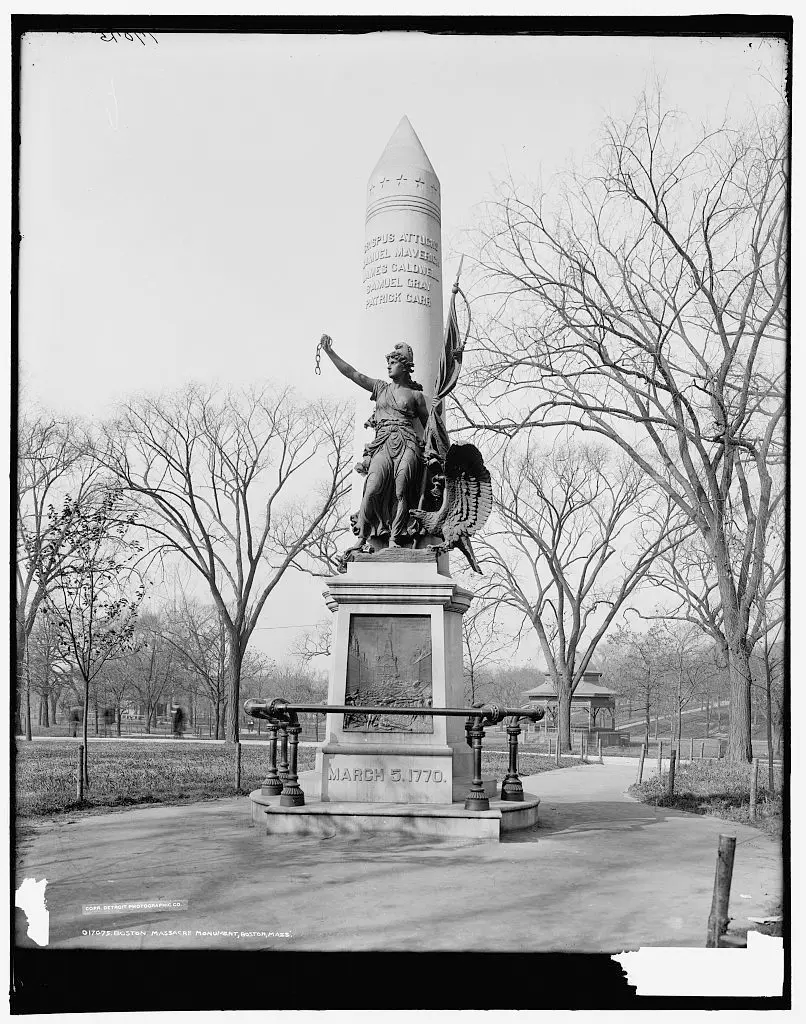
The Third Amendment to the United States Constitution
The Third Amendment is one of the strangest rights outlined in the US Constitution. It’s not every day that the military tries to set up shop inside your home. So why were our founding fathers so concerned about it? In the constitution’s own language, the Third Amendment guarantees, “No solider shall, in time of peace be quartered in any house, without the consent of the Owner, nor in time of war, but in a manner to be prescribed by law.” Unfortunately, this does not mean you have an excuse to kick your brother-in-law, the Army Major who has been living on your couch for years, out of your home. What it does mean is that the government can’t order you to keep your brother-in-law or any other soldier in your house against your will, unless it’s in a time of war, and then only if there is legislation approving it which was passed by the representatives you sent to Congress.

The Boston Massacre Monument
Detroit Publishing Co., Copyright Claimant, and Publisher Detroit Publishing Co. Boston Massacre Monument, Boston, Mass. Photograph. Retrieved from the Library of Congress,
A Response to The Quartering Act
The Third Amendment’s prohibition on “quartering soldiers” was primarily a response to the Quartering Acts of 1765 and 1774. After the French and Indian War (or if you are from across the pond, the Seven Years’ War), British soldiers that remained in the new world needed a place to stay. The British higher-ups thought it was only natural that the colonies should pay to support the standing army that was to remain in the colonies, since the British felt the war had been to the benefit of the colonists. The payment for housing of soldiers led to increasing tensions between the British soldiers and the colonists, which culminated with the Boston Massacre.
After rebellion by the colonists, Parliament passed the Coercive acts, or what we Americans know as the Intolerable Acts were passed, the fourth part of which, included the quartering act of 1774, which allowed the local British governors to find housing for soldiers, rather than the local legislatures. While it is disputed if the Quartering Act of 1774 allowed for quartering of troops in private homes, it was still among the complaints in the Declaration of Independence and was later added to provisions preventing the quartering of soldiers in the Bill of Rights.
Why is the Third Amendment Necessary?
But all of this leads to the question: why is the Third Amendment necessary? In more than 200 years of federal cases, the Third Amendment has only been relied on in any real way once by all of the major courts of appeals, and never in the Supreme Court of the United States. Perhaps the framers missed on this one—is the Third Amendment a waste of parchment paper?
The short answer is no. The Third Amendment’s passage meant that one of the first priorities of the federal government was to build barracks throughout the new country, and the construction of forts and on-base housing has been a necessary part of Congressional appropriations ever since. The existence of this right led to appropriate planning by the federal government to insure that citizens didn’t even have to invoke this right.
Future Implications for The Third Amendment
The Third Amendment still has some future goals, too (or at least, many hope to breathe new life into it). With concerns about government surveillance of private citizens, some lawyers and legal scholars believe a new realm of litigation may be available to challenge wiretaps and views into private technology on the same bases protected by the Third Amendment. But for now, we’re just glad the Third Amendment was a priority to the framers, and we wish that all amendments were as “self-executing” as this one!
If you enjoyed this article, you may also enjoy:
